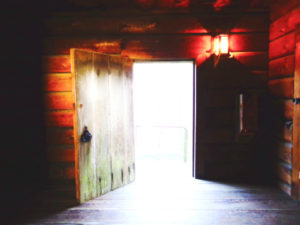You have no items in your cart. Want to get some nice things?
Go shopping In another room—burgundy, forest green—tarnished brass, a dim chandelier. Prisms above filter electric light from ancient bulbs, their zigzagging filaments dim and yellow. There, an enormous painting, its gilt frame, intricate, ornate, the patina lends a quiet luster to its pastoral landscape: a babbling stream snaking through trees—smooth, white sycamore; flaky, ashen birch; rugged, loamy oak. Just perceptible, the hint of a hill, yes, behind the trees, atop its mossy cliff and gnarled cedar roots. The longer you look, the more you discover, until its quiet enough to hear the wind crest the hill, the leaves underfoot, the trickling creek. But behind you on the opposing wall, you feel your attention being drawn, you turn—the spell dissolved—to find a small, round table, a vase like an inkwell and a small black flower. The door you entered is closed; you don’t remember its shutting, and before you another door ahead, the knob octagonal glass, its facets smooth and cool as discovered quartz. Turning. The door opens to another room you float into, its newness expanding, the old room receding; ahead you see another door still far away.
In another room—burgundy, forest green—tarnished brass, a dim chandelier. Prisms above filter electric light from ancient bulbs, their zigzagging filaments dim and yellow. There, an enormous painting, its gilt frame, intricate, ornate, the patina lends a quiet luster to its pastoral landscape: a babbling stream snaking through trees—smooth, white sycamore; flaky, ashen birch; rugged, loamy oak. Just perceptible, the hint of a hill, yes, behind the trees, atop its mossy cliff and gnarled cedar roots. The longer you look, the more you discover, until its quiet enough to hear the wind crest the hill, the leaves underfoot, the trickling creek. But behind you on the opposing wall, you feel your attention being drawn, you turn—the spell dissolved—to find a small, round table, a vase like an inkwell and a small black flower. The door you entered is closed; you don’t remember its shutting, and before you another door ahead, the knob octagonal glass, its facets smooth and cool as discovered quartz. Turning. The door opens to another room you float into, its newness expanding, the old room receding; ahead you see another door still far away.
This room is square like each one before. The air is warm with candle smoke, and your shirt encloses the stale way of borrowed clothing worn too many days. A humble wooden chair belonging to a dining room somewhere, sits alone in front of a coal-black fireplace, and though the room is empty, you feel someone had sat there only moments before you entered. Who? Will they return? The black of a thousand extinguished fires makes the hearth a cave, too dark to tell its depth. Above, a mantle of dark-stained cherry; a few candles nearly spent are flickering, left burning, you feel, for someone’s return—but who? This room is as foreign as the last. The distant door is closer now; you watch half-expecting someone’s arrival, but only silence til a creak behind like a groaning floorboard; yes, those foot-worn floors, their woodgrain fissures all curving together, meandering as one, like handprints mapping across the palm. You turn to the sound, but there no one stands, though far from empty: an old schoolroom desk, and a crude shelf of books—canvas bound, faded reds, greens, and blues, dingy pages, dank and moldy. A child was here, you think to yourself and picture a figure hunched over in study, toiling, cold. You think of the new door approaching, but a book shifts on its shelf, and all the others leaning against it. You near the book to read its spine, but the indistinct words are smudges in shadow. Whose books? Who will read? A candle flame extinguishes into its own wax, and the next door opens.
This room is eggshell plaster all around. Cracks here and there, nail holes where pictures once hung. Against each wall, a twin bed with wrought iron headboard, floral comforters the fabric of rented lodging curtains. Curtains. You haven’t seen a window. Where are the windows? There in the corner, a square grate in the wall. A vent? You hear nothing. Wait. It bangs and jumps as though nudged by a boot; its hollow echo decays, but then, a murmur? A voice? Two hinges, two fasteners. Is there a coin handy? Was that someone? You suddenly feel you’re being watched. Immediately behind you, there. But no, only a coat tree: two long coats, a jacket, a hat. You turn for the door approaching, but in the periphery, you’re almost certain someone is watching, but again, no, only gray wool, black felt—no one. One last look at the grate and when the new door swings open, you’re sure now, one more look, it had to be someone. Why are they watching you?
This room is all tile, turquoise, aquamarine, blues and greens. The floor blurs below two feet of crystal water, neither warm nor cool, and you observe there are no feet, no shoes below where you stand. You try to focus on the glare on the water—if it settles, surely a reflection, but it’s never still, ever-shimmering in miniscule soundless ripples. At the room’s center, a small round drain, its tarnished cover like buried copper. How can this be? Standing water. On the two walls, golden angels holding candles like torches; their wings are folded, tucked to their sides, their faces solemn, eyes fixed on the water. You follow their stare—the drain—and feel yourself falling, drifting through its covering, flowing down into deeper tunnels, black and cold, swift and frenetic, but on you float into the next door, opening.
You’re tired of rooms, rooms and doors. Never a door on one hand or the other, but always ahead, another door opening, always behind, the old door closing.
A round white light shines above, frosted panes arranged in a dome, vines and leaves painted on the outer edge. Too white for the sun this light. Both walls at your sides are covered with tapestries, three to the wall, green, blue, red to the right, black, white, and gray to the left. A unicorn for the green, a fish on the blue, a dragon the red—a horse on the black, a moth on the white, a skeleton the gray. The floors are marble with patchwork cracks. A breeze. The white tapestry shudders, flutters, then waves, and you glimpse it: what seems like a tunnel, craggy walls crumbling into darkness. Where does it lead? The stirring stops. The tapestry settles. The tunnel is covered. Behind the moth there must be a way. You hear a door shifting on its hinges. It opens, you’re through.
Thick, heavy curtains, golden ropes and tassels. The ropes pull and the curtains divide from the center, moving towards the walls, revealing another curtain. Again they open, another curtain, again, again, again, until finally, an opening door.
This room empty, worn dirt floor, swept clean and hard like smooth concrete. The walls pine logs, straw on the ground. It’s winter somewhere. Night. It’s cold somewhere. Clear. Do you remember stars? Wasn’t there light? Worlds between each pinpoint far? But voices now, muffled and low. The next room. Yes. Music? A party perhaps. Finally. But as you reach the door, a tinge of sadness. What are you leaving? This room. What was here? Something important. The smell of pinesap bleeding from the walls. You’ve forgotten something. Can’t we wait? you think, and the next door opens like it’s been closed for years, like its frame might fall without its support.
Women in gowns, men in suits, but as you enter the room, they turn toward the walls. The chattering hushes, the music lowers. The backs of heads, their bitter silence—this golden, wine-colored room. Won’t someone look at me? but no one will. The next door grows closer. So be it, you think. Devil take this faceless lot. As you drift by, their bodies turn. They’re watching you now; you watch the door. They’re turning to you, but you won’t turn to them. Another door, an old room behind.
So many rooms later, you barely seem to notice now, what crowds the floors, what adorns the walls, the colors, the smells, the sounds, the air—you only see the next door approaching. Your pace may slow, but you can’t stop moving, always propelled forward, another door, another room. And with every new room there’s nothing familiar, apart from the feeling hidden strangers are watching, that previous rooms held some secret, that this passage is old and endless, and still a quiet voice inside yourself whispers, There must be a way.

About Dean Tuck
Dean Marshall Tuck's stories can be found in print in journals such as Epoch, Fugue Journal, The Los Angeles Review, Appalachian Heritage, and Natural Bridge, and online in journals such as SmokeLong Quarterly, Vestal Review, and Fiction Southeast. He has work forthcoming in Columbia Journal.




